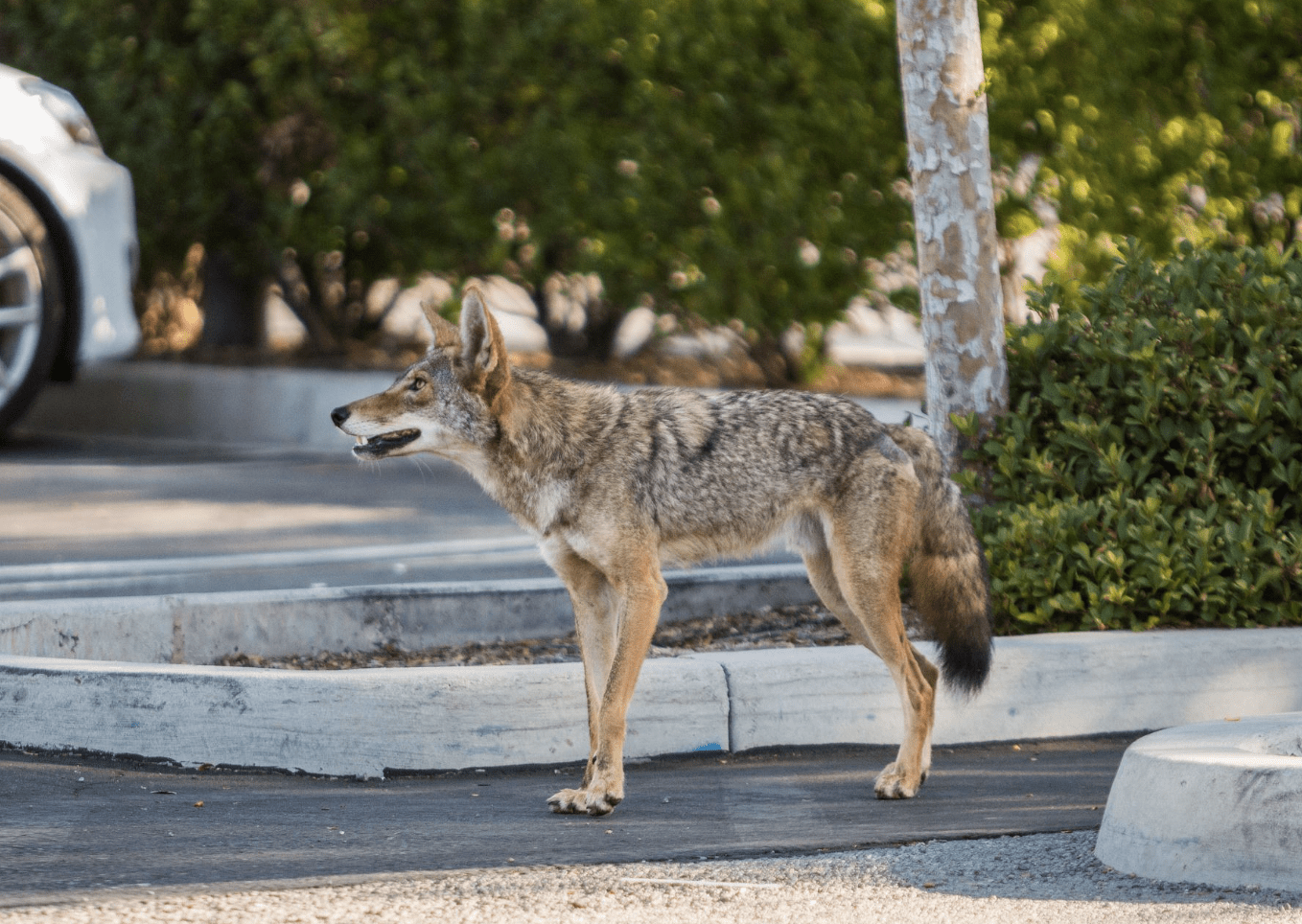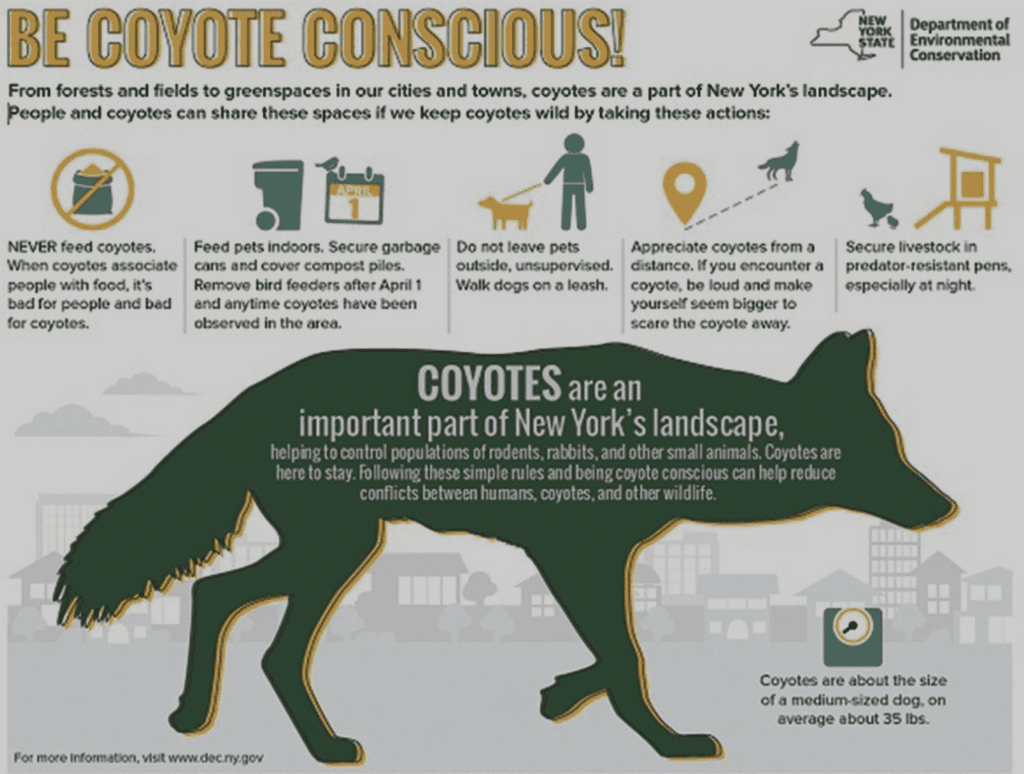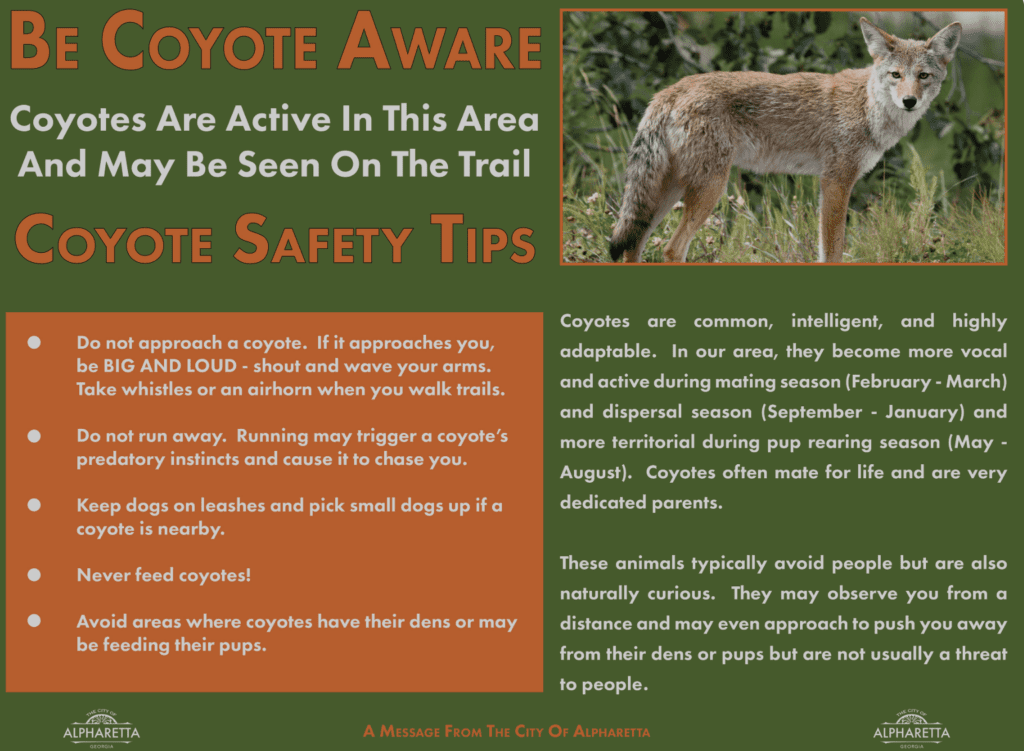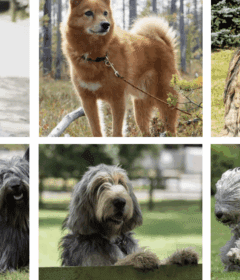Tactics to Use With Coyotes

Tactics to Use With Coyotes – Coyotes are naturally fearful of humans and they will try to avoid interaction.
However, they can learn to tolerate humans when nothing “bad” happens in their presence.
Coyotes can increase their proximity tolerance for humans when they find food ‘rewards’ in an urban setting or when they receive food directly from a person.
Aversion conditioning is used to reverse this learned behavior and sensitize coyotes to people and urban spaces.
Humane hazing is a form of aversion conditioning used to compel coyotes to move away and keep a respectful and safe distance from humans.
Tactics to Use With Coyotes – In addition to aversion conditioning, there must be a concerted effort to locate and eliminate any food resources that might have attracted the coyote(s) in the first place.

Tactics to Use With Coyotes – Hazing Principles
When hazing a coyote, a person’s clear delivery of confidence and assertiveness is more important than props or sophisticated tools.
A coyote may be less responsive to hazing in close proximity to a den site or pups, a food resource, when a domestic dog is present, young pups present, where a coyote is guarding a prey item, or toward a
sick or otherwise debilitated coyote.
Retreating from a coyote or failure to follow through with hazing can lead to the coyote being more complacent or at ease.
Humane Hazing Basics
Never run from a coyote.
Never corner a coyote; always allow it a safe escape route.
If accompanied by a dog, be sure the dog is on a leash no longer than 6’ and at your side.
Deploy basic hazing techniques to create distance between you and the coyote(s) as you move out of the area – slowly.
Stand tall and make yourself big.
Make and maintain eye contact.
Most importantly, advance toward the coyote until it retreats.
If it stops and stares back, keep advancing – You want it to move out of your sight.


Tactics to Use With Coyotes – How To Keep Coyotes Away
There are a number of deterrents that you can use to scare off coyotes.
But some of the methods are far more effective than others.
Make yourself appear even bigger, you can use props, waving a stick or article of clothing in the air, opening an umbrella, or snapping open a large garbage bag as you advance.
If you feel the need to extend your reach, throw a projectile toward (not at) the animal as you advance, like sticks, a clump of dirt, rocks, use a super soaker, boat air horn or shake coins in a can or bottle.
BB guns are permitted i rural areas but in densely populated areas shooting a BB gun is usually not permitted.
Keep Pets & Animals Inside
Coyotes are natural-born predators.
They hunt down small animals, presenting an ever-growing threat for small pets and livestock.
Bring all of your pets inside at night.
Make sure your pet food bowl are taking in at night inside as well.
It’s a good idea to keep a watchful eye on small pets during the day as well.
Coyotes like to observe prey before they hunt
them down.
While you might not see them, there could be watchful coyotes near your property.
Clean Up Your Property
One of the worst things you can do if you want to deter coyotes is let your yard become messy and
unkempt.
Overgrown vegetation and tons of yard debris are an open invitation for coyotes to move on in.
Coyotes love hiding out in tall grass and heavy vegetation.
They’re always looking for new places to lay unseen as they scavenge for food.
Tall grass and dense shrubbery are particularly troublesome.
You see, coyotes often travel in packs.
It’s when they feel most confident and safe to brave unknown territory.
When they’re alone, coyotes rely on ground cover to remain unseen.
Most coyotes are too weak to take on large predatory animals on their own.
So, they adopt a stealthier approach when exploring new areas like your yard.
A messy yard provides the coverage they need.
Keep your property clean and remove as many potential hiding spots as possible.
Trim back overgrown bushes, prune trees, and keep the lawn mowed.
Tactics to Use With Coyotes – Minimize Attractants
Many items can draw coyotes to your domain.
These creatures are on the constant hunt for food and shelter.
Your outdoor trash bin is teeming with smells that
coyotes can’t resist – invest in secured bins that offer a tight seal..
Take your trash security up a notch by investing in metal lock boxes or cages.
The same security measures should apply to compost piles, too.
Many homeowners forget to think about that steaming pile of decaying organic matter they have in their backyard.
But giving them free rein of that pile of food scraps will only train them to come back.
Some overlooked examples include food for outdoor pets, livestock food dishes.
Store as many of those items away before the sun sets if possible.
Put Up A Good Fence
A solid fence is one of the best coyote deterrents out there.
However, standard barriers won’t do since coyotes can jump fences.
Coyotes are fully capable of leaping several feet into the air.
On top of that, they can use their agile legs to scale tall fences without missing a beat.
As a result, standard six-foot fences are no match for these canines.
For height, aim for a fence that’s at least seven feet tall.
Choose a solid fencing material to ensure that coyotes can’t scale the wall and overcome that height.
Avoid chain link or vertical slats, as they’ll only serve as ladder rungs for perseverant coyotes.
You can use vertical wood slats, large fence panel systems, or even smooth concrete.
Designs with few textures and no potential footholds offer the best results.
Don’t forget about the ground below.
When coyotes can’t jump over the fence to get food, they might try to dig below it.
To prevent that, extend the fence to a foot or two below ground level.
You can also bury some chicken wire or metal grates several feet out from the base to keep coyotes away.
Fence extenders sit on top of the barrier and protrude about 45 degrees out.
Tactics to Use With Coyotes – Use Sound To Your Advantage
Coyotes hate loud noise.
It terrifies them to no end, so you can easily use noise to your advantage.
Try banging some pots together, blasting an air horn, or blowing a whistle.
Any sudden noise you make will make your property that much more unappealing.
Sensor-based alarms are pretty cheap and easy to install.
Like standard security systems, they rely on motion to
trigger the alarm.
Try Coyote Repellent
Like most canines, coyotes rely on their sense of smell for just about everything.
They sniff around to find food and are usually drawn to yards because of the enticing aroma of garbage nearby.
Most repellents assault a coyote’s senses to make your property uninhabitable.
If you want to go on the offensive, try using repellents that irritate their sense of smell.
Some of the best repellents to keep coyotes away are ammonia, mothballs, vinegar, and pepper.
To use ammonia, soak some old rags or cotton balls.
Place the ammonia-soaked item in crucial areas around your property where coyotes might venture.
For example, you can place some at the bottom of the trash can or next to the fence line.
You can do the same with mothballs and pepper powder.
Mothballs slowly release gas vapors that irritate the senses.
Meanwhile, cayenne pepper powder can cause a world of discomfort for coyotes that are unlucky enough to take a sniff.
Vinegar is offensive as well.
You can create a spray mixture with white vinegar and water.
Commercial repellents are available as well.
You can find offensive-smelling sprays that deter all
kinds of pests. In addition to coyotes, they might keep raccoons and other household pest animals
away.
Some products also utilize urine or pheromones.
These sprays mimic the natural smells of coyote
predators, such as wolves.
When the coyote smells the urine or pheromones, they’ll avoid the area because they think the danger is nearby.
All coyote repellents only provide temporary results.
Sprays can evaporate or wash away with heavy
rains.
If you plan to try a repellent, make sure to reapply regularly if you want to keep them away in the long term.
If you have outdoor cats, you MUST TAKE
AWAY THE FOOD before 5 PM or better after your cats have eaten – 30 minutes is recommended
before taking food away twice a day.
Do NOT Feed Birds, Wildlife, or Leave Cat Food Outside
Feeding any kind of wildlife will attract larger animals.

Different Dog Personalities >>
Why Dogs Are a Necessity for Humans >>
How Your Bernese Mountain Dog Communicate With You>>



